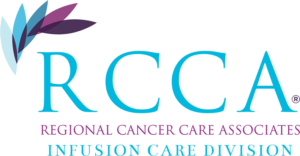Plaque Psoriasis
Plaque Psoriasis
Plaque Psoriasis Treatment in NJ, CT, and MD
Plaque psoriasis is an autoimmune condition characterized by flaky, itchy lesions on the skin. These lesions, known as plaques, may flare up as the result of triggers, and then become less noticeable during periods of remission. Regional Cancer Care Associates offers infusion services for patients with plaque psoriasis and other chronic conditions. With locations throughout New Jersey, Connecticut, Maryland, and the Washington, D.C. area, Regional Cancer Care Associates offers a convenient way for patients to receive their infusion treatments close to home.
What Is Plaque Psoriasis?
Although it is not clear what causes plaque psoriasis, flare-ups are thought to be the result of an autoimmune response, in which the body mistakenly attacks healthy cells. Normal skin cells take about a month to grow and then shed. In a person with psoriasis, an overactive immune system speeds up the process of skin cell development. Some of the person’s skin cells grow in just a few days – but instead of shedding, they pile up on the surface of the skin, creating plaques.
While several different types of psoriasis can appear on different parts of the body, plaque psoriasis is the most common form of the condition. Plaques appear as dry, raised patches of skin that may be flaky, bumpy, or itchy. After plaques heal, they may leave behind hyperpigmentation (temporary discoloration of the skin). Plaques can appear anywhere on the body, but most often show up on the:
- Scalp
- Elbows
- Knees
- Knuckles
- Lower back
Plaque psoriasis can be emotionally challenging – it’s common for patients to feel self-conscious about their appearance during flare-ups. They may want to wear long sleeves or a hat to cover up plaques on their skin.
therapies offered
- Amjevita™ (Adalimumab -atto)
- Cyltezo® (Adalimumab-adbm)
- Erelzi® (Etanercept-szzs)
- Eticovo™ (etanercept-ykro)
- Hulio (adalimumab-fkjp)
- Hyrimoz™ (adalimumab-adaz)
- SILIQ ® (SQ)
- Skyrizi®
- TALTZ® (SQ)
- STELARA®
- Tremfya®
- Inflectra® (Infliximab-dyyb)
- Renflexis® (Infliximab-abda)
- Abrilada™ (adalimumab-afzb)
- Cimzia®
- COSENTYX®
- Ilumya®
 Symptoms of Plaque Psoriasis
Symptoms of Plaque Psoriasis
Plaques look like a patchy rash and can appear anywhere on the skin. Plaque psoriasis can vary in color and may be flaky or scaly. Symptoms of plaque psoriasis can include:
- Dry, cracked skin
- Itching or burning sensation
- Soreness or bleeding at the site of plaques
Plaque psoriasis is sometimes accompanied by psoriatic arthritis, which causes joint pain, stiffness, and swelling. According to the American Academy of Dermatology, about 25% of patients with psoriasis have joint inflammation as well. Some patients have psoriasis on their skin for several years before developing psoriatic arthritis. Plaque psoriasis may also be accompanied by nail psoriasis, which can cause fingernails and toenails to become discolored and separate from the nail bed.
Risk Factors for Plaque Psoriasis
While plaque psoriasis looks like a rash, it is not contagious. However, anyone can develop the condition – and there is no clear way to prevent it. Risk factors for plaque psoriasis include:
- Substance use: Patients who smoke, use tobacco products or drink alcohol are at elevated risk for plaque psoriasis. Smoking may also increase the severity of the disease.
- Heredity: Patients with a family history of plaque psoriasis are at higher risk.
- Racial background: Rates of plaque psoriasis are highest among white patients.
Rates of psoriasis appear comparable among male and female patients. Different factors can trigger psoriasis flare-ups among patients who are predisposed to the disease, such as:
- Heavy alcohol consumption
- Exposure to cold, dry weather
- Infections, such as strep throat
- Injuries or trauma to the skin, such as scrapes or sunburns
- Exposure to secondhand smoke
- Certain medications
Diagnosis and Treatment of Plaque Psoriasis
Plaque psoriasis can be diagnosed with a skin exam. Patients may be referred to a dermatologist by their primary care provider for further examination, as conditions like eczema and dermatitis may look like psoriasis. Patients may also need allergy testing or blood work to rule out other skin conditions.
Oral and topical medications can help manage the symptoms of plaque psoriasis. Creams, lotions, gels, and prescription shampoos can be used to relieve itchy skin. Patients with more severe cases of psoriasis may need to take oral medications or infused biologic therapies. Some patients also benefit from phototherapy, which uses ultraviolet light to treat skin disorders.
Lifestyle changes may also help reduce the frequency and severity of flare-ups. These may include:
Improving One’s Diet
Eating foods with anti-inflammatory properties, such as leafy greens, may help manage plaque psoriasis. Some physicians recommend a diet that is low in fat and high in nutrients and lean proteins, including food such as:
- Fruits and vegetables
- Beans and lentils
- Nuts and seeds
- Whole grains
- Fish
- Olive oil
Patients may also want to avoid foods that can worsen flare-ups, such as dairy products, nightshade vegetables, and foods that are high in gluten and added sugar.
Avoiding Prolonged Exposure to Hot Water
Too much hot water can dry out the skin and make plaques more irritated, so patients with psoriasis should stick to shorter baths or showers, and should bathe using lukewarm water. Patients should also look for bath products and laundry detergents that are fragrance-free and formulated for sensitive skin. Keeping the skin moisturized and wearing loose-fitting clothing may also help.
Managing Stress
Because stress can trigger flare-ups, people with plaque psoriasis need to take care of their mental and emotional well-being. Utilizing practices like yoga and meditation can help manage stress. Exercising regularly, getting enough sleep, and consulting with a mental health professional, if needed, can also be helpful.
Infusion Therapy for Plaque Psoriasis
Instead of taking a pill or receiving an injection, infusion therapy is a treatment that administers medication intravenously into a patient’s arm. Infusion therapy can be an effective means of treating chronic illnesses that require ongoing care. A patient may receive infusion services weekly, monthly, annually, or at other intervals depending on the type of medication and the recommended course of treatment.
At Regional Cancer Care Associates, we administer several types of infused medications that dermatologists prescribe to treat their patients’ plaque psoriasis. We work with patients and their referring providers to coordinate care and implement individualized infusion therapy plans. Before an infusion, the medical team at Regional Cancer Care Associates provides patient education to make sure patients are fully informed about their condition and what treatment entails.
Receiving infusion treatment at a community care center balances safety and convenience: patients don’t have to deal with navigating a major hospital, but they still have access to qualified and experienced medical professionals. Regional Cancer Care Associates treats thousands of patients each year and is well-versed in the latest biological treatments.
Plaque Psoriasis Care for Patients in NJ, CT, & MD
At Regional Cancer Care Associates, patients in New Jersey, Connecticut, Maryland, and the Washington, D.C. area can receive convenient infusion services in a relaxing and welcoming setting. We don’t just serve patients undergoing cancer treatment – individuals can receive infusion therapy for a wide range of chronic conditions, including asthma, osteoporosis, and Crohn’s disease, as well as plaque psoriasis Regional Cancer Care Associates has multiple locations so that patients can get the care they need close to home. To learn more about infusion treatment or schedule an appointment, call 844-474-6866 or contact the office today.
CONVENIENT LOCATIONS IN NEW JERSEY, CONNECTICUT, MARYLAND, AND THE WASHINGTON DC AREA
For more information, or to schedule an appointment, call (844) 474-6866. You can also schedule an appointment by calling the RCCA location nearest you.

 Symptoms of Plaque Psoriasis
Symptoms of Plaque Psoriasis